1. Introduction
Como 1907, a football club steeped in history and tradition, has been a cornerstone of the Italian football landscape since its establishment. Founded in 1907, the club has experienced a storied journey, marked by significant achievements and a resilient spirit. Recently, Como 1907 achieved a significant milestone by securing promotion to Serie A.
Recognizing the evolving digital landscape and the increasing demand for personalized fan experiences, Como 1907 is poised to become the first football club in the world to implement Non-Fungible Tokens (NFTs) as a substitute for traditional membership cards. NFTs, unique digital assets verified using blockchain technology, have revolutionized the concept of ownership and authenticity in the digital realm. By adopting NFTs, Como 1907 aims to offer its supporters a novel, secure, and engaging way to experience their affiliation with the club, setting a pioneering precedent in the football world.
This white paper explores the potential of NFTs to transform Como 1907's membership system, outlining the benefits, challenges, and practical considerations of this innovative approach. It delves into the technological framework of NFTs, the unique advantages they bring to football club memberships, and the roadmap for their integration into the club's operations. Through this exploration, we aim to provide a comprehensive understanding of how NFTs can enhance fan engagement, create new revenue streams, and set a precedent for the future of football club memberships.
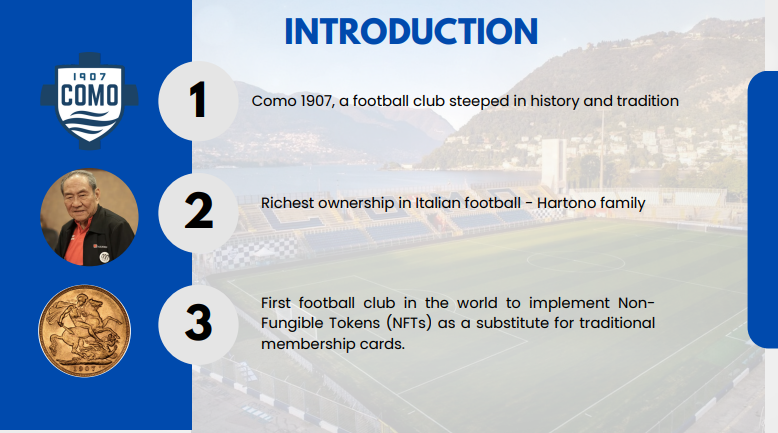
2. Problem Statement
Current membership and transfer processes in football clubs are often manual and inefficient, leading to several operational challenges and a less satisfying experience for fans. These traditional systems create significant obstacles, particularly when a fan with a club membership card and a season ticket wants to give away their ticket for a single game. This situation can arise for various reasons, such as personal commitments, travel, or unforeseen circumstances.
The existing system poses specific problems in this context:
-
Delayed Transactions: Transferring a season ticket under the current system typically requires manual verification and approval processes. Fans often need to contact the club's administrative offices, fill out forms, and wait for confirmation. This cumbersome procedure can cause delays, preventing timely access to games for the new ticket holder.
-
Inflexibility in Ticket Transfers: One of the most significant issues is that fans without a club membership card cannot receive a transferred season ticket for a single game. This means that if a club member wishes to give their ticket to a friend or family member who is not a member, it becomes a complicated process, often resulting in the inability to complete the transfer. This restriction limits the flexibility for current ticket holders to share their tickets and hampers the club’s ability to attract new potential supporters.
-
Lack of Transparency: The manual nature of these processes means there is little visibility into the status of a ticket transfer. Fans and club administrators struggle to track and verify the authenticity of transferred tickets, leading to potential confusion and dissatisfaction.
These issues lead to delayed transactions, lack of transparency, and dissatisfaction among members and stakeholders. A report by Deloitte highlights that inefficiencies in sports club management can lead to significant financial losses and decreased member engagement. According to the report, clubs that fail to modernize their operations and adopt more efficient, transparent systems are at risk of losing revenue and alienating their fan base.
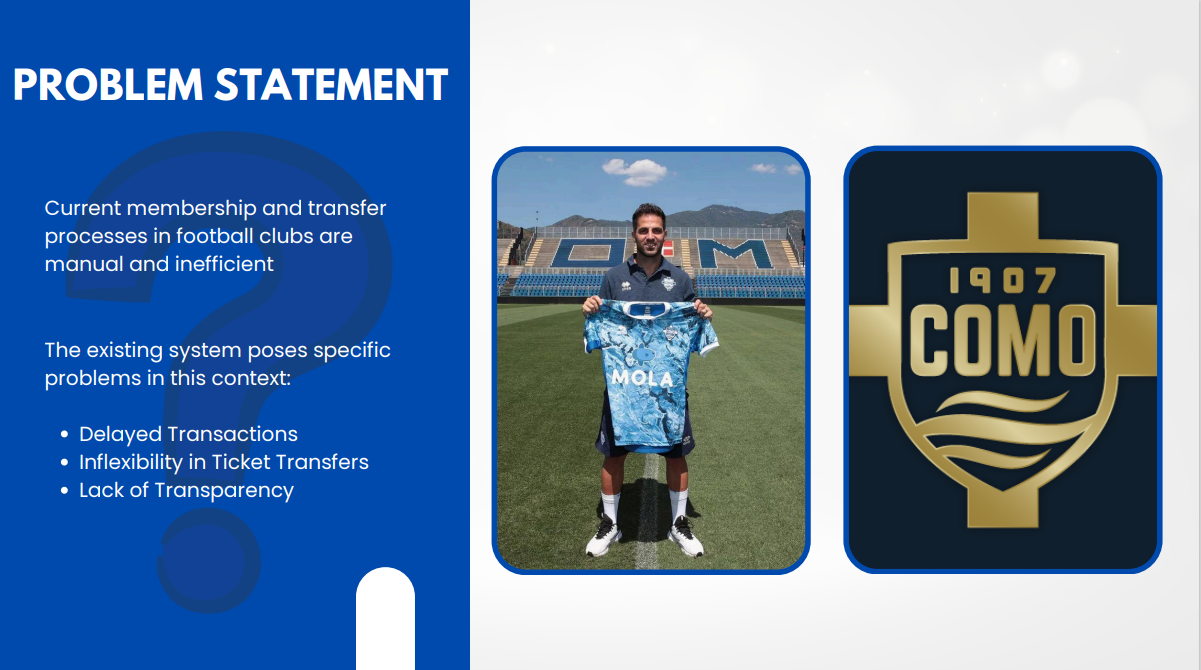
3. Solution
The implementation of Non-Fungible Tokens (NFTs) as a substitute for traditional membership cards offers a transformative solution to the challenges faced by football clubs in managing memberships and ticket transfers. NFTs, unique digital assets verified using blockchain technology, can provide a secure, transparent, and efficient way to revolutionize the membership experience for fans and club administrators alike.
Transforming Club Membership Cards to NFTs
By converting traditional club membership cards to NFTs, Como 1907 can leverage the inherent advantages of blockchain technology to enhance the overall experience for its supporters. This transformation will address the issues outlined earlier and provide several key benefits:
-
Streamlined Ticket Transfers: With NFTs, the process of transferring a season ticket becomes seamless and instantaneous. Fans can easily transfer their NFT-based season tickets to others, regardless of whether the recipient holds a club membership card. This flexibility ensures that tickets can be shared with friends, family, or any potential supporter, enhancing accessibility and convenience.
-
Increased Transparency: Blockchain technology provides a transparent and immutable ledger for tracking all transactions. This means that every transfer of an NFT-based membership card or ticket is recorded and verifiable. Both fans and club administrators can have real-time visibility into the status of ticket transfers, reducing confusion and increasing trust in the system.
-
Enhanced Security: NFTs are secured by blockchain technology, which makes them resistant to fraud and counterfeiting. The unique digital signature of each NFT ensures that only the legitimate owner can transfer or use the ticket, preserving the integrity of the ticketing process.
-
Improved Fan Engagement: By adopting NFTs, Como 1907 can offer fans a more engaging and interactive experience. NFTs can be integrated with additional digital content, exclusive offers, and personalized experiences, creating a richer and more rewarding membership program. This can drive increased loyalty and engagement from the club's supporters.
-
New Revenue Streams: The use of NFTs opens up new opportunities for monetization. The club can issue limited-edition NFTs, create collectable digital assets, and explore partnerships with sponsors for exclusive NFT-based promotions. These initiatives can generate additional revenue for the club while providing unique value to fans.
-
Operational Efficiency: Automating the membership and ticket transfer processes through NFTs reduces the administrative burden on club staff. This allows the club to focus more on strategic initiatives and improving the overall fan experience, rather than being bogged down by manual processes.
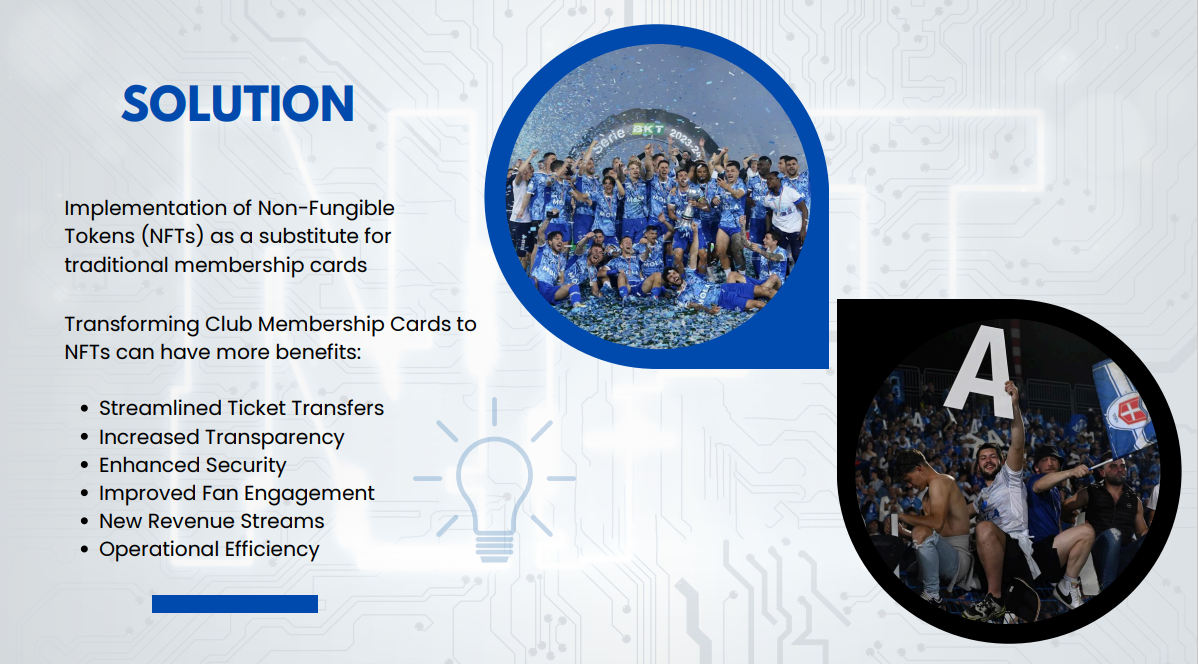
4. Technology Stack
After evaluating various blockchain platforms, Ethereum stands out as the best choice for this project. Its established ecosystem is ideal for smart contracts and NFTs, offering the advanced functionality needed to handle the complex logic required for minting, transferring, and managing NFTs. This capability is essential for implementing features like dynamic pricing, secondary sales royalties, and special event access.
Interoperability is another key advantage of Ethereum for this project. The ERC-721 standard for NFTs is widely accepted, ensuring that NFTs created on Ethereum can be easily traded across multiple platforms and used in various applications. Additionally, Ethereum’s compatibility with Layer 2 solutions and cross-chain bridges allows for scalability.
To address scalability and cost management, Polygon will be used on top of Ethereum. This approach will achieve faster and more cost-effective transactions while maintaining security and decentralization. Utilizing Layer 2 solutions such as Polygon ensures that the minting and transferring of NFTs remain efficient and affordable for our fans.
The technical implementation involves several key components. This project will use the ERC-721 standard to create unique, indivisible NFTs representing season tickets. Each NFT will contain metadata such as seat number, match dates, and additional perks. Smart contracts will handle the minting process, ensuring each ticket is unique and verifiable, with a user-friendly interface for fans to purchase season tickets.
To ensure that the club benefits from ticket resales, the ERC-2981 standard will be implemented, which supports royalty payments on secondary sales. Integration with NFT marketplaces will facilitate these resales, enabling Como 1907 to receive a percentage of the resale value, thus generating ongoing revenue.
For user authentication and ticket validation, fans will use digital wallets to store and manage their NFT tickets. Integration with popular wallets like MetaMask ensures accessibility and ease of use. At the stadium, QR codes or NFC technology linked to the NFT will be used for seamless entry, with smart contracts verifying ticket authenticity at the gates.
Additional features will further enhance the fan experience. Smart contracts will dynamically update the NFTs to include perks like merchandise discounts, exclusive content, or VIP access based on predefined conditions such as match outcomes or attendance. The project will also integrate with platforms such as Discord or Twitch to offer fan engagement features like virtual meet-and-greets or exclusive behind-the-scenes content.
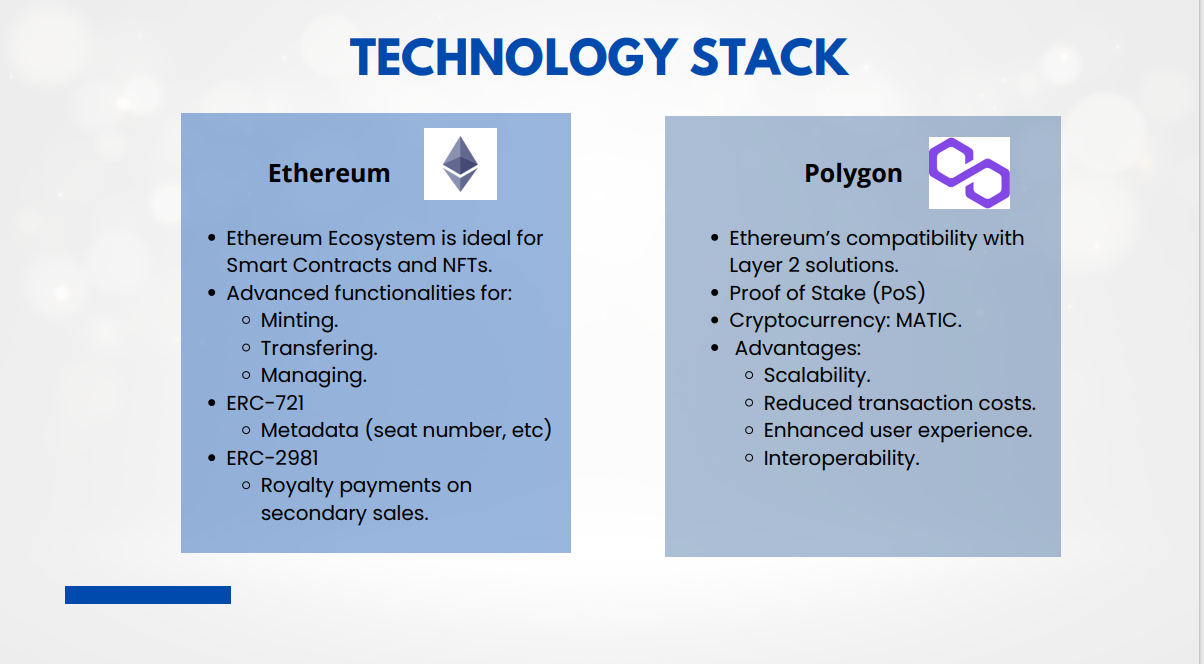
5. Tokenomics
The tokenomics strategy for Como 1907's NFT season ticket project is intricately designed to maximize fan engagement and provide substantial benefits. The primary purpose and utility of the Como token are to grant fans enhanced access and privileges beyond traditional season tickets, including voting on club decisions, exclusive content, and participation in rewards programs. The integration of Socios.com and Chiliz plays a crucial role in this ecosystem, facilitating seamless token exchange and utilization.
Token holders will enjoy numerous exclusive benefits. These include discounts on club merchandise and tickets, priority access to ticket sales, and participation in special events such as meet-and-greets with players, VIP matchday experiences, and exclusive online events. Additionally, fans will have access to NFT drops, with some NFTs offering special giveaways like game tickets, jerseys, and VIP experiences.
The distribution of tokens is structured to ensure broad participation and support the club's long-term goals. A total of 500 million tokens will be allocated strategically. Initially, 50% of the tokens (250 million) will be used in an Initial Token Offering (ITO) to raise funds for project development. Subsequently, 20% of the tokens (100 million) will be allocated for loyalty programs and member rewards, incentivizing ongoing fan engagement. Another 25% of the tokens (125 million) will be reserved by the club for future needs, strategic investments, and maintaining system stability. The remaining 5% of the tokens (25 million) will be dedicated to community-building activities, partnerships, and promotional efforts to foster a robust and engaged supporter base.
The integration of Socios.com and Chiliz is central to the technical implementation of the tokenomics strategy. Socios.com operates on the Chiliz blockchain, an Ethereum sidechain, ensuring compatibility with Ethereum-based NFTs and facilitating seamless integration with Polygon. This integration is enabled through bridge mechanisms that allow NFTs to be transferred between Ethereum/Polygon and the Chiliz blockchain. This ensures that NFTs and tokens can be utilized within the Socios.com ecosystem, enhancing fan engagement through various interactive features.
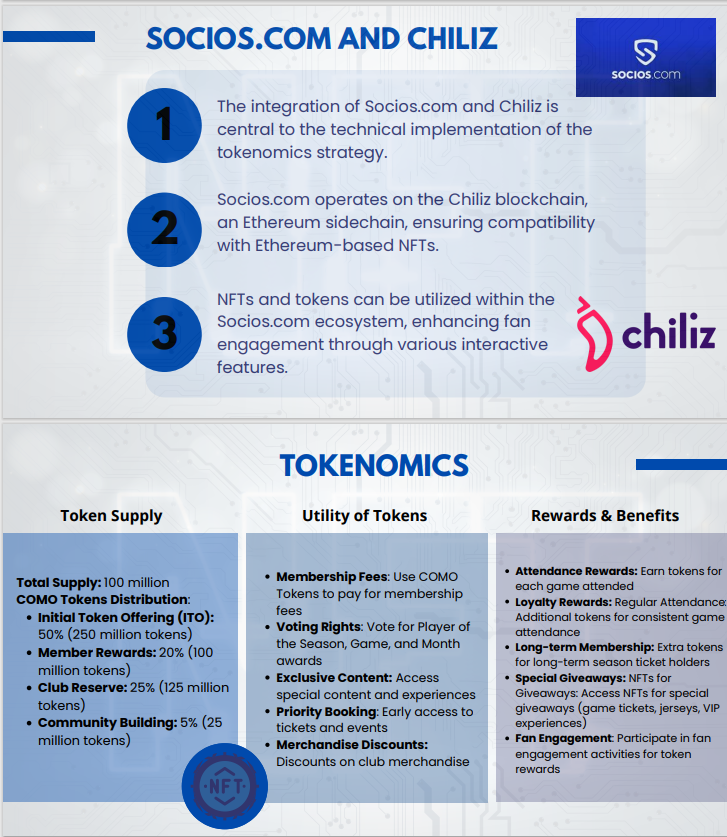
7. Legal and Compliance
The blockchain-based membership management system for the Como 1907 Football Club should adhere to several regulatory frameworks and laws to ensure legal compliance and build trust among its members and stakeholders. These regulations need to cover data protection, financial services, and specific blockchain and crypto-asset requirements. The identified key EU and Italian regulations that the project should comply with are:
EU Regulatory Compliance
-
General Data Protection Regulation (GDPR)
-
Ensures the protection of personal data and privacy for individuals within the European Union.
-
Key provisions include data subject rights, lawful processing, data minimization, and accountability.
-
-
Markets in Crypto-Assets (MiCA) Regulation
-
Provides a harmonized regulatory framework for crypto-assets across the EU.
-
It covers asset-referenced tokens, e-money tokens, and other crypto assets.
-
Ensures transparency, consumer protection, market integrity, and prevention of market abuse.
-
Requires crypto-asset service providers to obtain authorization and comply with operational and prudential requirements.
-
-
Anti-Money Laundering Directive (AMLD5 and AMLD6)
-
Sets out measures to prevent money laundering and terrorist financing.
-
Requires due diligence, record-keeping, and reporting of suspicious transactions by crypto-asset service providers.
-
Italian Regulatory Compliance
-
Italian Data Protection Code (Codice in materia di protezione dei dati personali)
-
Implements GDPR at the national level.
-
Provides specific guidelines and requirements for data protection and privacy in Italy.
-
-
Italian Civil Code
- Governs contractual agreements and obligations, ensuring that membership terms and conditions are legally enforceable.
-
Italian Consumer Code (Codice del Consumo)
-
Protects consumer rights and provides regulations on commercial practices, contracts, and consumer information.
-
Ensures transparency and fairness in membership agreements and transactions.
-
-
Italian Legislative Decree No. 231/2007
-
Implements AMLD at the national level.
-
Sets out anti-money laundering and counter-terrorist financing obligations for financial and non-financial entities, including crypto-asset service providers.
-
-
Bank of Italy Regulations
- Provides additional guidelines and supervisory regulations for financial activities, including those involving digital assets and blockchain technology.
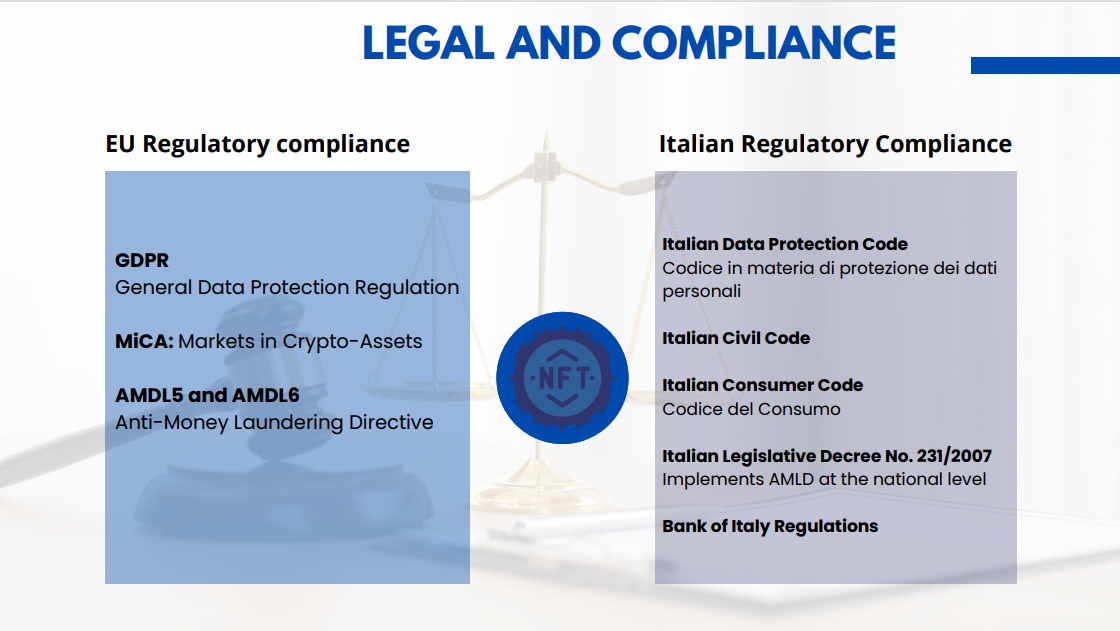
8. Community and Marketing Strategy
8.1. Community Engagement Plan
To effectively engage with both crypto-savvy users and traditional football club supporters, we will implement a multifaceted community engagement plan. This plan includes four areas that can run simultaneously: AMAs, webinars, interactive fan sessions, and partnerships with football influencers. We defined who should host, when, and where we would promote them, as well as some major topics for these events/initiatives.
- AMAs (=Ask me anything) with club executives and coaches
Host: Como 1907 Executives, Cesc Fàbregas.
Frequency: Monthly.
Platforms: Reddit, Twitter, Discord, Club’s Official Website.
Topics: Club updates, blockchain-based membership system, team performance, upcoming matches.
Promotion: Announcements via social media, club newsletters, and official website.
- Educational webinars on blockchain and NFTs
Host: Blockchain experts and club representatives.
Frequency: Two times a month.
Platforms: Como FC official website.
Topics: Introduction to blockchain and NFTs, benefits of blockchain-based membership, and how to use the new system.
Promotion: Social media as the main channel, but also email marketing, and partnerships with crypto communities.
- Interactive sessions for fans
Host: Club ambassadors and players.
Frequency: Quarterly.
Topics: Q&A with players and fan engagement initiatives.
Promotion: Targeted ads and social media posts, also through football fan forums.
- Partnerships with football influencers
Influencers: Popular football personalities and crypto influencers.
Platforms: Club's social media, guest appearances at the mentioned above events such as webinars, club matches, and special fan events.
Topics: Influencers would discuss their experiences with the blockchain system, interact with fans, have sponsored content, joint live streams, and social media takeovers.
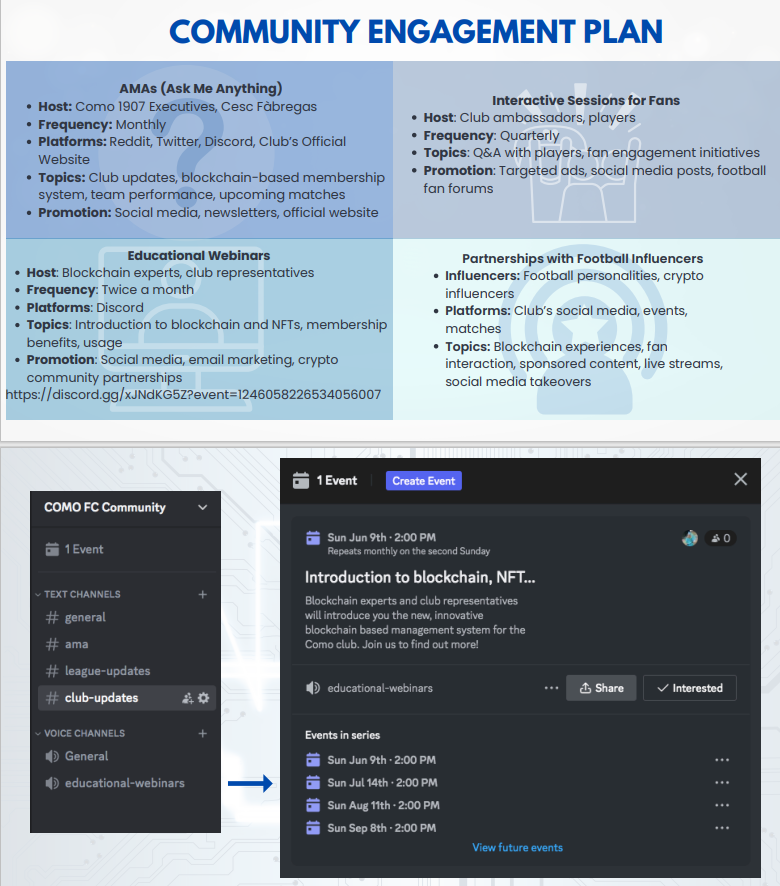
8.2. Marketing Strategy
The marketing strategy for promoting Como 1907's blockchain-based membership system is designed to achieve three primary objectives: increase awareness, drive adoption, and enhance fan engagement. By targeting both crypto-savvy users and traditional football club supporters, the campaign aims to bridge the gap between cutting-edge technology and long-standing football traditions.
Our target audience includes individuals familiar with blockchain technology and NFTs, as well as long-time supporters of Como 1907 who may be less familiar with these innovations. The key messages we will convey focus on innovation, emphasizing that Como 1907 is pioneering the first blockchain-based membership system in football; benefits, highlighting the enhanced security, transparency, and unique experiences this system offers; and inclusivity, ensuring fans that the new system is user-friendly and accessible to everyone, regardless of their tech-savviness.
To reach a diverse audience, we will have a mix of digital and traditional marketing channels. In digital marketing, social media campaigns would be the main focus and would be launched across platforms: Twitter, Facebook, Instagram, and LinkedIn, featuring educational posts, promotional videos, and infographics that explain the benefits of blockchain membership. Engagement will be driven through contests, polls, live Q&A sessions, and community engagement initiatives. Email marketing will include regular newsletters with updates on club activities, blockchain membership benefits, and upcoming webinars, as well as personalized emails targeting specific segments of our audience with tailored content. SEO and content marketing efforts will involve publishing blog posts on the club’s website about blockchain technology, NFTs, and their benefits, with a strong SEO strategy to optimize content for relevant keywords.
Traditional marketing tactics will also play a crucial role. Print media, such as brochures and flyers, will be distributed at stadiums, fan clubs, and local businesses, while magazine features in sports and tech publications will explain the new membership system in depth.
Community engagement is another cornerstone of our strategy. In addition to the community engagement plan with the AMAs, webinars, and influencers, we will host a grand launch event to unveil the blockchain-based membership system, followed by matchday promotions with booths and representatives at games to explain the new system and assist with sign-ups.
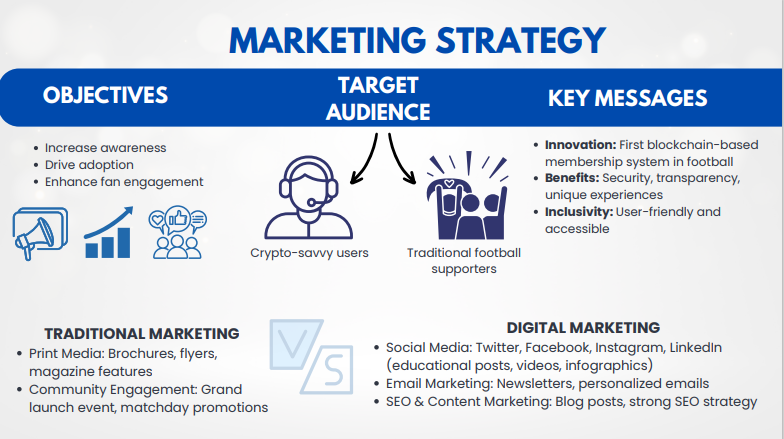
Below is an outline of the marketing strategy timeline with three phases:
Phase 1: Pre-Launch (Months 1-3)
-
Develop Marketing Materials: Create educational content, promotional videos, and print materials.
-
Influencer Partnerships: Secure agreements with influencers.
-
Webinars and AMAs: Schedule initial webinars and AMAs to educate the community.
-
Social Media Build-Up: Start a teaser campaign to generate the »buzz«.
Phase 2: Launch (Months 4-6)
-
Launch Event: Host a grand unveiling of the new membership system.
-
Intensive Promotion: Increase the frequency of social media posts, email newsletters, and traditional ads.
-
Webinars and AMAs: Continue educational sessions as planned, focusing more on onboarding users.
Phase 3: Post-Launch (Months 7-12)
-
Ongoing Engagement: Regular webinars, AMAs, and influencer collaborations to maintain interest (focusing on the diversity of the content).
-
User Feedback: Gather feedback and make necessary adjustments.
-
Fan Events: Host quarterly fan events to keep the community engaged.
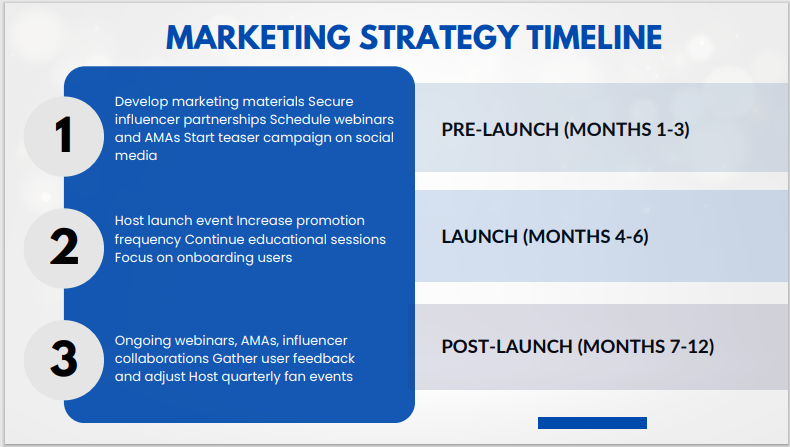
9. Risk Factors
Technical Risks: Smart Contract Vulnerabilities
Smart contracts are automated, self-executing contracts with the terms of the agreement directly written into code. While they offer numerous benefits, they are also vulnerable to bugs and security flaws. If a vulnerability is exploited, it could lead to unauthorized access, financial losses, and damage to the club's reputation. Mitigation Strategies:
-
Code Audits: Engage third-party security experts to perform comprehensive audits of the smart contract code. Regular audits should be scheduled to ensure ongoing security and regulations compliance.
-
Upgradable Contracts: Use upgradable smart contracts that allow for patches and updates without disrupting the system. This can ensure that any discovered vulnerabilities can be swiftly addressed.
-
Security Best Practices: Follow best practices for smart contract development, such as modular design, minimalistic approach, and using established libraries and frameworks.
Regulatory Risks: Compliance with EU and Italian laws
The blockchain-based membership management system must comply with various regulations, including GDPR for data protection, MiCA for crypto-assets, and AMLD5/6 for anti-money laundering. Non-compliance can lead to legal penalties, financial losses, and reputational damage. Mitigation Strategies:
-
Compliance Officer: Appoint a dedicated compliance officer responsible for monitoring regulatory changes, implementing compliance measures, and ensuring ongoing adherence.
-
Data Protection Measures: Implement robust data protection measures, such as encryption, anonymization, and secure data storage, to comply with GDPR and other data protection laws.
-
Regulatory Engagement: Maintain open lines of communication with regulatory bodies to stay informed about potential regulatory changes and engage in discussions to shape favorable regulations.
-
Comprehensive Policies: Develop and enforce comprehensive policies and procedures that cover data handling, user consent, anti-money laundering measures, and other regulatory requirements.
Adoption Risks: Resistance to change
Como Football Club members and stakeholders, accustomed to traditional membership systems, may resist transitioning to a new blockchain-based system. This resistance can hinder the new system's adoption and success. Mitigation Strategies:
-
Clear Communication: Communicate the new system's benefits clearly and effectively. Highlight how it enhances security, transparency, and convenience for members.
-
User-Friendly Interface: Ensure the new system has an intuitive, user-friendly interface that simplifies the transition for members. Offer support and assistance during the initial stages of adoption.
-
Incentives: Offer incentives for early adopters, such as discounts on membership fees, exclusive content, or additional rewards in COMO Tokens.
-
Feedback Mechanism: Implement a feedback mechanism to gather input from members and address any concerns or issues they may have during the transition. Use this feedback to make necessary improvements to the system.
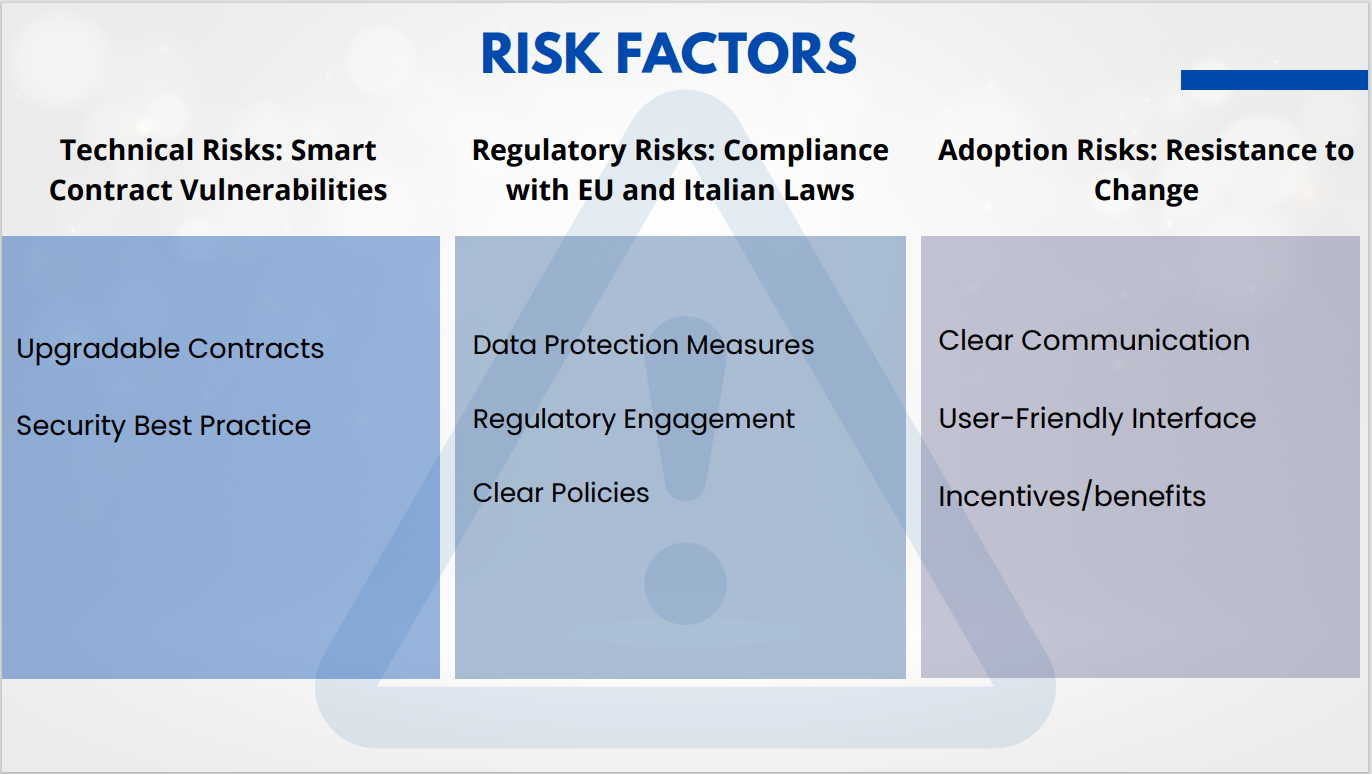
10. Conclusion
The implementation of a blockchain-based membership management system is a significant evolution in football club operations. It uses the unique advantages of blockchain technology (transparency, security, and efficiency) to streamline membership and transfer processes, addressing existing inefficiencies and enhancing fan engagement. By adopting the NFTs, the club modernizes its operations as well as sets a new standard in the sports industry, offering a secure, engaging, and more personalized experience for the fans.
Our proposed system is supported by a technological framework including Ethereum, Proof of Stake consensus, and smart contracts. The introduction of the COMO Token facilitates various transactions within the ecosystem, providing additional benefits such as discounts, priority booking, and access to exclusive content, which all enhance the fan experience.
However, the transition to a blockchain-based system is not without challenges. Technical risks, regulatory compliance, and potential resistance to change among members are significant considerations that the club must address through testing, legal adherence, and comprehensive education and training programs. By implementing these mitigation strategies, Como 1907 can ensure a smooth transition and adoption of this new system.
Overall, our solution positions Como 1907 at the forefront of technological innovation in football, and the successful implementation of this blockchain-based system has the potential to set a precedent for other clubs, paving the way for a more efficient, transparent, and engaging future for football club memberships worldwide.
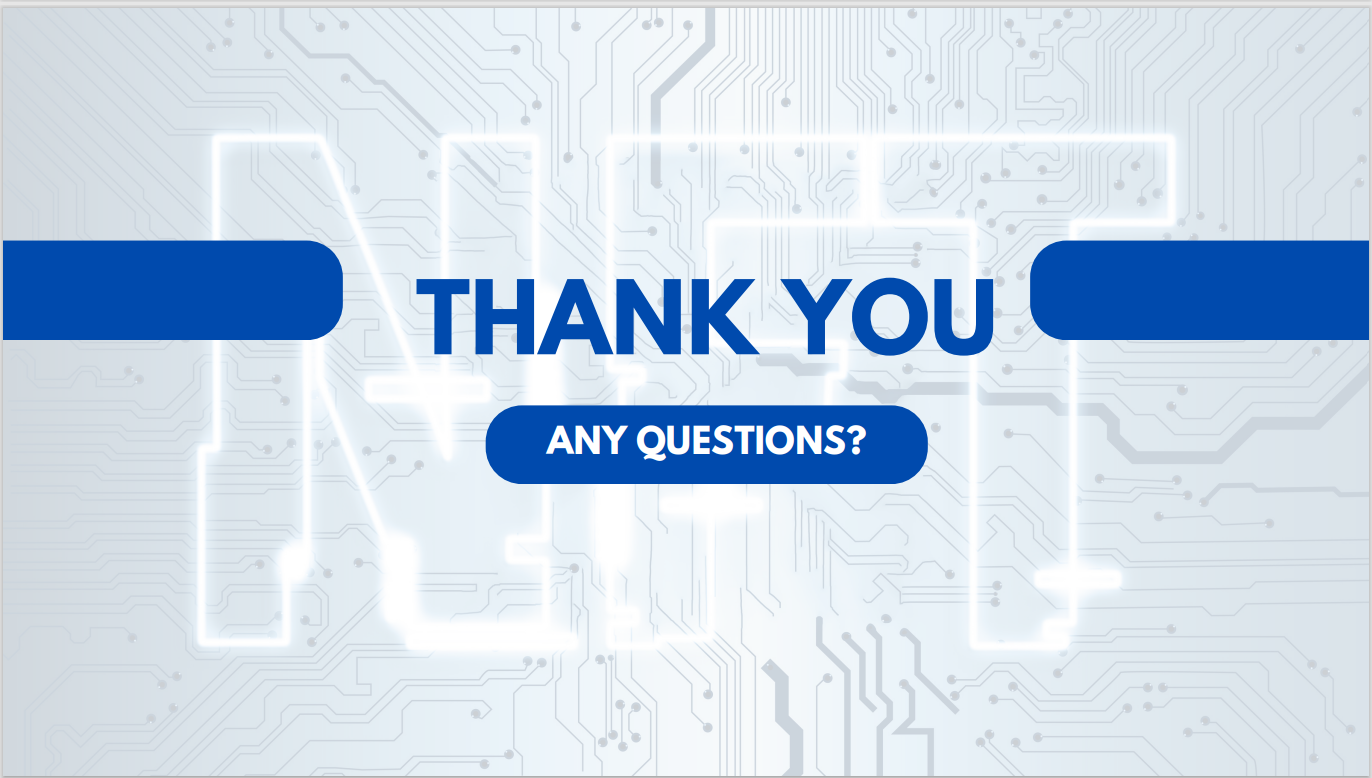




评论 (0)